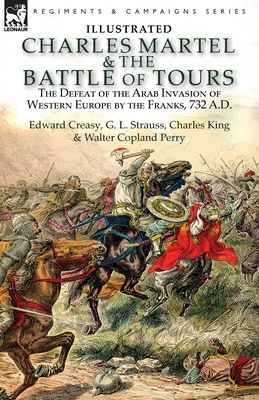Charles Martel & the Battle of Tours: the Defeat of the Arab Invasion of Western Europe by the Franks, 732 A.D

Charles Martel & the Battle of Tours: the Defeat of the Arab Invasion of Western Europe by the Franks, 732 A.D
A great collision of armies under the banners of the crescent and the cross
The Battle of Tours (also called Poitiers) in 732 A.D. was one of the most significant battles fought during the last two millennia. This book is far more than just a description of the battle, it also recounts, through the writings of several academic contributors, the story of two emergent empires, drawn together on converging paths which resulted in a collision not simply between two armies, but between two uncompromisingly different cultures and faiths. Described in these pages is the violent and turbulent rise of the Franks in Europe who, by the time of the battle of Tours, were led by their warrior king, Charles Martel--'the Hammer'--whose dynasty brought forth the Emperor Charlemagne. From the Middle East, Islam was conquering and spreading its political influence, which are outlined as they bore upon the invasion of Europe. By the sixth century, Umayyad Caliphate armies had swept along the Mediterranean coastline of North Africa, crossed over into Spain and could see no impediment in the mountain barrier of the Pyrenees to their farther expansion. So France faced an invasion by an army accompanied by their families and belongings who had come to stay and rule. That army, under Abdul Rhaman al Ghafiqi, in the valley of the Loire and less than 140 miles from Paris collided with the Frankish and Burgundian battle host and was brought to ruin. In later centuries the Moors successfully ruled Spain and the Ottoman Turks also attempted to invade western Europe but were defeated before Vienna. However, after Tours never again did a Muslim army drive so far westwards and despite the sectarian blood-letting that lay ahead, for which the Europeans themselves were responsible, this fact defined the culture and dominant religion of the modern continent. Included are illustrations which did not accompany the original texts.
Leonaur editions are newly typeset and are not facsimiles; each title is available in softcover and hardback with dustjacket.
PRP: 125.65 Lei
Acesta este Prețul Recomandat de Producător. Prețul de vânzare al produsului este afișat mai jos.
100.52Lei
100.52Lei
125.65 LeiLivrare in 2-4 saptamani
Descrierea produsului
A great collision of armies under the banners of the crescent and the cross
The Battle of Tours (also called Poitiers) in 732 A.D. was one of the most significant battles fought during the last two millennia. This book is far more than just a description of the battle, it also recounts, through the writings of several academic contributors, the story of two emergent empires, drawn together on converging paths which resulted in a collision not simply between two armies, but between two uncompromisingly different cultures and faiths. Described in these pages is the violent and turbulent rise of the Franks in Europe who, by the time of the battle of Tours, were led by their warrior king, Charles Martel--'the Hammer'--whose dynasty brought forth the Emperor Charlemagne. From the Middle East, Islam was conquering and spreading its political influence, which are outlined as they bore upon the invasion of Europe. By the sixth century, Umayyad Caliphate armies had swept along the Mediterranean coastline of North Africa, crossed over into Spain and could see no impediment in the mountain barrier of the Pyrenees to their farther expansion. So France faced an invasion by an army accompanied by their families and belongings who had come to stay and rule. That army, under Abdul Rhaman al Ghafiqi, in the valley of the Loire and less than 140 miles from Paris collided with the Frankish and Burgundian battle host and was brought to ruin. In later centuries the Moors successfully ruled Spain and the Ottoman Turks also attempted to invade western Europe but were defeated before Vienna. However, after Tours never again did a Muslim army drive so far westwards and despite the sectarian blood-letting that lay ahead, for which the Europeans themselves were responsible, this fact defined the culture and dominant religion of the modern continent. Included are illustrations which did not accompany the original texts.
Leonaur editions are newly typeset and are not facsimiles; each title is available in softcover and hardback with dustjacket.
Detaliile produsului










